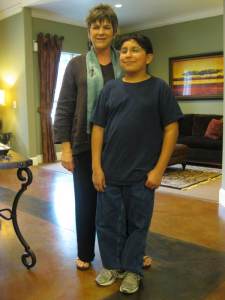by Janis Bookout
Kids are naturally curious about money. A while back, my husband and I were talking to our 7 year old, Evan, about chores. He said, “Can I get paid?” My immediate reaction was to say, “Well, chores are a natural part of being a family. We all pitch in because we all live here.”
Unexpectedly, my son’s eyes filled with tears. “But mom” he said, I want to buy something for myself and how else am I supposed to get money? I don’t want to have to ask you for it. But how else am I going to get it?”
It hit me like a brick. My son wanted to be responsible for creating and using income. What an opportunity and I was just about to miss it! All my training from the work I have done with The Money Academy came rushing to mind. I could hear Gayle’s voice in my head. “Give them something to be responsible for.” I don’t want my son thinking that money comes from me. That would not set him up for life at all.
So we talked about it and we came up with three ways that he could get money: 1) He could start a business; 2) We could give him an allowance; 3) He could be paid for doing a job at home. Personally, I was hoping he’d start a business. He’s done that once before and it was awesome! (Sold 20 CD’s of his music, netted $80, paid me back my loan of $35, and learned a LOT about money.) But this time he wanted to earn money through chores. But I still didn’t want him to get locked into doing a task for money. That’s not the future I want for him. So we made him the Living Room Manager. He is accountable for making sure the living room is clean by the end of every day. And he isn’t allowed to do the job by himself. The position pays $5 a week. He has agreed to put 10% in savings, and he has a bank bag and a ledger to keep track of his money. (Anyone who has done The Money Academy will find some of these things every familiar.)
What an opportunity I almost missed! As a parent, it’s so easy to stop listening. But then when I do listen, there are these crazy-great moments in time where my kids ask to be developed in something. Money is one of those areas where kids just naturally want to step up and learn—if we let them.
Evan will be doing The Money Academy summer camp for the first time at the end of the summer. I’m really looking forward to hearing about what he’s learning and accomplishing. Oh, and my five year old, Ryan, is the car manager. It pays $3 per week. He loves telling us all to take our trash out of the car. And the car and living room haven’t stayed clean this long in years!
*Janis is a staff writer and registration manager for The Money Academy.





